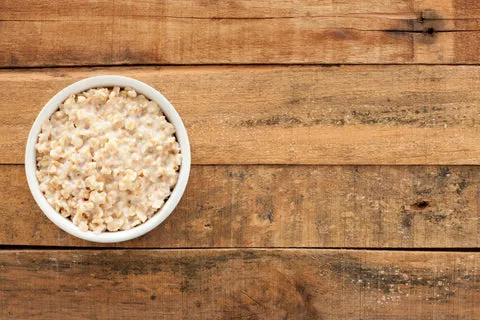When your beloved canine companion isn’t feeling well, their usual enthusiastic appetite often disappears, leaving you wondering what to feed a sick dog. Just like humans, dogs frequently lose interest in their regular food when they have an upset stomach or are generally under the weather. Providing them with easily digestible, nutritious food is crucial to help replenish their energy levels and support a speedy recovery. This guide will walk you through ten of the best food options for dogs experiencing a sensitive stomach and offer advice for dogs prone to allergies. Understanding what to feed your dog when they are sick can make a significant difference in their comfort and recovery. For a broader perspective on dietary options during illness, you might also be interested in what dogs can eat when they’re sick.
Understanding Your Sick Dog’s Dietary Needs
The primary goal when feeding a sick dog is to provide nourishment that is gentle on their digestive system while still supplying essential nutrients. A plain, bland diet is typically recommended for dogs with upset stomachs. It’s always a good idea to have some readily available, healthy options in your pantry for those unexpected turns in your dog’s health, ensuring you’re prepared to nurse them back to health. However, if your dog’s sickness persists, or if they exhibit severe symptoms, consulting your veterinarian for personalized advice is paramount.
10 Best Foods for Dogs with Upset Stomachs
When faced with a dog who has a sensitive tummy, these ten nutritious and easily digestible options can be lifesavers, helping to settle their stomach and support their overall recovery.
1. Boiled White Meat (Chicken or Turkey)
Plain white meat, such as lean chicken or turkey breast, is an excellent choice for a sick dog. It’s easy to digest and low in fat, providing a crucial source of lean protein without overwhelming their sensitive stomach. Always remember to thoroughly cook the meat and remove any skin or bones before serving to eliminate choking hazards and ensure it’s gentle on their digestive system.
To prepare, rinse the meat under cold water, remove excess fat, skin, or bones, and place it in a pot covered with water. Bring to a boil, then reduce the heat to a simmer for 15-20 minutes until fully cooked. Once done, drain the water, cut the meat into small, bite-sized pieces for easier digestion, and allow it to cool before serving alone or with white rice or vegetables.
 A small Chihuahua dog looking up, anticipating food
A small Chihuahua dog looking up, anticipating food
2. White Rice
White rice is a staple in many dog foods and a highly effective option for an unwell dog. Its blandness makes it easy to digest, making it a safer choice than brown rice, which, despite being more nutritious, can be harder on a sick dog’s system. White rice is particularly helpful if your dog has diarrhea, as it can help bind their stools and encourage their digestive system to normalize. For other healthy meat options for your dog, including those suitable for regular diets, you can explore what type of meat is good for dogs.
To prepare white rice for your dog, rinse it under cold water, then add it to a large pan with two parts water to one part rice. Bring to a boil, adding a small pinch of salt. Reduce the heat to a simmer, cover, and cook on low heat for about 18 minutes, or until all the water is absorbed. Let it rest and cool, then fluff with a fork before serving.
 A Collie dog looking longingly at an empty food bowl
A Collie dog looking longingly at an empty food bowl
3. Sweet Potatoes
Cooked sweet potatoes are a fantastic, gentle option for soothing a dog’s upset stomach and intestines. They are rich in essential vitamins and fiber, providing beneficial calcium, iron, and magnesium to boost your dog’s health. It is crucial to never feed raw sweet potatoes to your dog, as they are tough to digest and could exacerbate stomach issues.
Instead, peel the skins, chop the potatoes into chunks, and boil them until soft. After draining, mash them thoroughly and allow them to cool completely before offering them to your dog.
 Cooked sweet potato slices arranged on a wooden table
Cooked sweet potato slices arranged on a wooden table
4. Pumpkin
Similar to sweet potatoes, pumpkin is highly effective in easing an upset stomach and helping a sick dog feel better. It’s packed with vitamins that support a robust immune system and is rich in fiber, which aids in regulating digestion.
You can give your dog up to four tablespoons of plain, cooked pumpkin with their meal (or alongside chicken and rice) to support their recovery. Canned pumpkin can be as effective as fresh, provided it contains no added sugars, spices, or other ingredients. Always avoid pumpkin pie seasoning or anything with added sugar, as these can worsen your dog’s stomach upset.
 A Siberian Husky dog posing with a pumpkin slice, appearing to smile
A Siberian Husky dog posing with a pumpkin slice, appearing to smile
5. Homemade Bone Broth
Bone broth is a nourishing choice for sick dogs, offering essential nutrients and minerals like sodium and potassium, which also contribute to hydration. When preparing, avoid using garlic or excessive salt, as these can further irritate your dog’s stomach. Being low in carbohydrates and easily digestible, bone broth is gentle and ideal for a dog with an upset stomach. For those considering other bone options, understanding what raw bones dogs can have is important, though for sick dogs, broth is often safer.
To make bone broth for your dog, add beef or pork marrow bones and chicken or turkey bones to a large cooking pot. Cover them with several inches of water and simmer on low heat for 20-24 hours. Once cooked, strain the liquid to remove all bones before serving it cooled to your dog.
 A small puppy licking a bowl of bone broth
A small puppy licking a bowl of bone broth
6. Baby Food
For puppies struggling with an upset stomach, stage 2 meat-based baby foods, such as chicken, lamb, or turkey purees, can be an effective and easily digestible feeding option. The smooth texture makes it easy to chew and swallow, which is beneficial for puppies experiencing discomfort. However, it is crucial to carefully check the ingredients list to ensure there are no additives or ingredients toxic to dogs, such as garlic or onion powder. If you are ever uncertain about specific ingredients, consult your veterinarian for guidance.
 Multiple Doodle puppies eating from a communal plate
Multiple Doodle puppies eating from a communal plate
7. Fish
Fish is an excellent source of healthy fats and vitamins, which can significantly boost your dog’s immune system and overall health when they are recovering from an upset stomach. Its strong aroma can also be very enticing, helping to encourage a sick dog with a lost appetite to eat again. The best way to prepare fish for your dog is by poaching it. Similar to boiling chicken, add the fish to a pan of water, bring it to a boil, then reduce the heat and simmer for 10-15 minutes until fully cooked. Always remove all bones and cut the fish into small, manageable pieces before feeding it to your dog.
8. Oatmeal
Plain, cooked oatmeal, made from rolled oats, can provide a soothing effect on your dog’s upset stomach. Rich in fiber, it can help alleviate constipation and contains antioxidants that are beneficial for reducing stomach inflammation. While oatmeal is generally good, moderation is key. Too much fiber can sometimes worsen a dog’s upset stomach, so feed it sparingly.
 A warm bowl of plain oatmeal on a rustic wooden table
A warm bowl of plain oatmeal on a rustic wooden table
9. Yoghurt
Plain, unsweetened yogurt, full of beneficial probiotics, is an ideal food for a dog with an upset stomach. It aids in digestion and supports gut health, and if your dog is constipated, the probiotics can help regulate their digestive system. Natural, plain yogurt is easily found at most grocery stores, making it a convenient option if your dog suddenly falls ill. It can even be frozen and served as a cool, soothing treat on a warm day.
10. Eggs
As long as your dog is not actively vomiting, eggs are a great food choice for sick dogs. They are gentle on the stomach and provide a good source of protein, which is essential for recovery. Eggs are also an excellent energy booster, perfect for dogs feeling a bit lethargic after an illness. For other human foods that can be safely shared, knowing what human meat dogs can eat can be helpful for general diet considerations.
The best ways to prepare eggs for your sick dog are scrambled without butter or oil, or simply boiled. However, if your dog is currently vomiting, it’s best to avoid eggs entirely.
Dietary Considerations for Dogs with Food Allergies
If your dog frequently experiences an upset stomach or regular sickness, it might be an indication of food-related or breed-specific allergies. In such cases, consulting your veterinarian to determine the root cause is highly recommended. For dogs with sensitivities or diagnosed allergies, opting for specialized diets can significantly improve their comfort and health.
Regular kibble can be problematic for some dogs due to common allergens like grains, certain proteins, or fillers. Exploring alternative food types, such as cold-pressed dog food, insect protein-based options, or raw feeding approaches, can provide tailored solutions for sensitive tummies. These options often feature minimal processing, novel protein sources, and grain-free formulations, which can aid digestion and prevent allergic reactions. It’s also vital to be aware of what you should not feed your dog to prevent any allergic triggers or toxic reactions. Always introduce new foods slowly and monitor your dog for any adverse reactions.
Supporting Your Dog’s Recovery with Thoughtful Nutrition
Knowing What Should You Feed A Sick Dog is a vital part of helping your furry friend recover. By offering a bland, easily digestible, and nutrient-rich diet, you can provide comfort and support to their healing process. Remember that these recommendations are for general guidance; if your dog’s condition doesn’t improve or worsens, always seek immediate veterinary attention. Your commitment to their well-being, coupled with professional advice, ensures your dog receives the best possible care during their recovery. Explore more articles on Dog Care Story for tips on keeping your dog healthy and happy!
